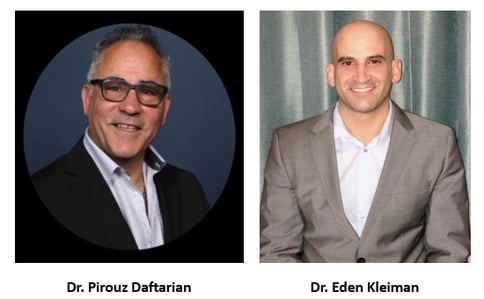Webinars
Explore our video library of webinars focused on different life science research topics and applications. All webinars are presented by our scientists at MBL International.
Do you want to learn how you can generate custom tetramers in only hours? Our latest webinar is On Demand now!
Rapid and Reliable Custom Tetramer Generation for T Cell Staining
Speaker: Yuri Poluektov, Ph.D., R&D Scientist at MBL International

In this webinar, Yuri Poluektov, Ph.D., explores the use of peptide-MHC exchange for generating custom human or mouse tetramers to identify antigen-specific T cells, to gather binding affinity information in MHC/peptide complexes, and in functional screening of immunogenic peptide. This is possible using tetramers that come loaded with a placeholder peptide and a peptide exchange factor, eliminating the need for complex techniques such as UV cleavage and putting the production and evaluation of custom tetramers within reach for any lab.
Dr. Poluektov discusses the applications of this technique in immunology and vaccine development, and reviews the theory and practice of the technology.
Topics include the following:
- How QuickSwitch™ MHC tetramer can find the right tetramer in just hours
- Using QuickSwitch™ to precisely customize unique tetramer complexes quickly
- QuickSwitch’s™ utility in measuring the stability of MHC complexes, which holds promise for steering vaccine development toward targeted solutions
Improve your organoid cultures with Wnt3a and FGF-Max
Kazuya Arai, MS

Join Kazuya Arai, MS, Research Leader presents: Improve your organoid cultures with Wnt3a and FGF-Max. This on demand webinar focuses on Wnt3a and FGF and how they can play a critical role for Adult Stem Cell-Derived Organoids.
Some key topics will cover:
- Stem cell niche and organoid culture
- Wnt3a as niche factor for organoid culture and a high-quality Wnt agonist, AFM/Wnt3a-CM
- Niche-composition refining of organoid medium and a thermal-stabilized universal FGF agonist, FGF-Max
The importance of in vivo isotype control selection in antibody-based studies
Dr. Beata Boczkowska

Dr. Beata Boczkowska, Product Manager, focuses on best practices for the use of isotype controls for in vivo studies in animals. Learn how to set up pre-clinical experiments that will easily transition to downstream clinical experiments easily.
Isotype control antibodies are essential negative controls for in vivo studies and can play a key role in immunoassays. Researchers with a suitable negative control will accurately discriminate between an antibody binding in an antigen-dependent specific manner from non-antigen dependent mAb binding due to Fc receptors (FcR) or other proteins. This webinar will help establish best practices for in vivo experimental design.
The webinar highlights:
- Applications utilizing monoclonal antibodies
- Various isotype antibodies explained
- Best practices for experimental design
Recall antigen assay to test the efficacy of checkpoint blockade therapeutics

Dr. Orkash Hushur, Business Development Manager/Study Director presents: Recall antigen assay to test the efficacy of checkpoint blockade therapeutics. Recall antigen assays are a useful tool, not only to evaluate the function of antigen specific T cells, but also to amplify the rare antigen specific memory T cells to a detectable level. Furthermore, because it is conducted immediately from a fresh or thawed PBMC sample and not after an artificial cell culturing, the experimental condition is close to in vivo conditions. You will also have the ability to ask specific questions at the end of the presentation.
This webinar will cover:
- The method to establish an ex vivo recall antigen assay
- The method to detect antigen specific T cell responses by using MHC tetramers
- The application to test efficacy of checkpoint blockade therapeutics
Please contact us if you would like to learn more about Recall Antigen Assay services or for assistance setting up your assay.
Detecting antigen specific T cells in conjunction with intracellular cytokines
Dr. Orkash Hushur, MBL International

Using multicolor staining to detect antigen specific T cells with MHC tetramers and antibodies against other biomarkers is a powerful analytical tool set. The information derived allows for profiling of antigen specific T cells by single analysis, and also provides time and cost savings to reduce the number of experiments and amount of precious samples and reagents used. Learn best practices and helpful tips for using MHC tetramers in conjunction with antibodies. You will also have the ability to ask specific questions at the end of the presentation. This presentation will cover:
- Basic staining protocol for antigen specific T cell receptor (TCR) together with other surface markers
- TCR and surface marker staining in conjunction with intracellular staining for cytokines
- Antigen specific cell positive control preparation by using an antigen recall method
Best Practices for Antigen Specific T Cell Detection using MHC Tetramers

In this presentation we focus on using MHC tetramers for cell surface staining to detect antigen specific T cell populations. We will also cover many interesting topics including, sample preparation for cell staining, gating strategies for Flow Cytometry and techniques to ensure reduced background and high signal.
Practical use of endoderm derived organoids generated from non-human primates
Professor Ken Iwatsuki of Tokyo University of Agriculture

In this presentation Professor Ken Iwatsuki of Tokyo University of Agriculture focuses on organoids and organoids culture. In addition he presents choices of Wnt3a sources and research examples using organoids from monkeys as well as a discussion with the audience.
Best Practices for Antigen Specific T Cell Detection using MHC Tetramers

In this presentation we focus on using MHC tetramers for cell surface staining to detect antigen specific T cell populations. We will also cover many interesting topics including, sample preparation for cell staining, gating strategies for Flow Cytometry and techniques to ensure reduced background and high signal.
T Cell Dysfunction Assays: Functional characterization of immunomodulatory candidate drugs
Presented by Dr. Pirouz Daftarian and Dr. Eden Kleiman, Crown Bioscience

In this presentation you will learn about T cell dysfunction assays developed using our tetramer technology and more including:
- Antigen specific CD4+ T cell responses for determining efficacy for candidate therapeutics
- Antigen specific CD8+ T cell responses for determining efficacy for candidate therapeutics
- Adenosine-based drug potency assay
Immune monitoring with MHC Tetramers and QuickSwitch™ Rapid Tetramer Technology
Presented by Dr. Marc Delcommenne, MBL International

In this presentation you will learn about our immune monitoring technologies and more including:
- Human MHC Class I Tetramers
- QuickSwitch™ Quant Tetramer Assays
- New COVID-19 Products